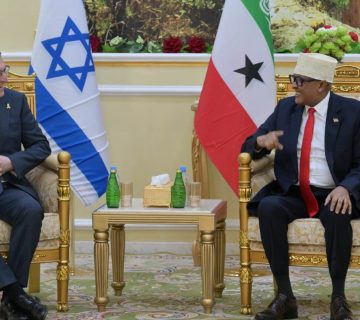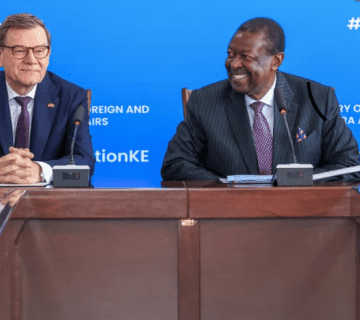The Francophone Summit, which is held after every two years, serves as a platform for French-speaking nations to strengthen cultural ties and address common political and economic issues. Established by the Organization international de la Francophonie (OIF), the summit aims to enhance collaboration, cultural exchange, and diplomatic relations within the Francophone community. This event brings together leaders from over 50 countries, enabling them to discuss global issues and promote solidarity among French-speaking nations. Given the diverse and sometimes conflicting interests within the community, the summit often becomes a space for both diplomacy and contention.
At the recent summit, a notable incident occurred when President Félix Tshisekedi of the Democratic Republic of Congo (DRC) chose to walk out. The walkout happened unexpectedly during a session, causing immediate reactions from other delegates and drawing attention to underlying tensions within the Francophone bloc. Tshisekedi’s departure was perceived as a strong statement, signaling discontent with specific issues raised during the summit or with the overall direction of the discussions. The incident highlighted discord not only between the DRC and other Francophone nations but also within the bloc’s efforts to maintain a cohesive and united stance on critical issues.
Several factors contributed to President Tshisekedi’s decision to leave the summit, underscoring complex geopolitical tensions and frustrations. A primary reason appeared to be the perceived marginalization of African issues within the broader agenda, with some African leaders, including Tshisekedi, feeling that critical concerns such as security, sovereignty, and economic independence were sidelined. Specifically, Tshisekedi may have been dissatisfied with the stance of certain Francophone nations, whose positions on the DRC’s internal and regional challenges, particularly the protracted conflict in the eastern DRC, may have seemed dismissive or unsupportive. For instance, some Francophone countries with historical ties to Rwanda are often perceived as lenient on Kigali’s alleged support for armed groups destabilizing the DRC, a point of contention for Kinshasa. This dissonance likely amplified Tshisekedi’s frustration, leading him to signal his disapproval by exiting the summit, an act that highlights the deepening rift between DRC’s leadership and key Francophone nations on addressing regional instability. Additionally, Tshisekedi may have viewed the summit’s approach as unbalanced, favoring the perspectives of European Francophone countries over those of African nations. Tshisekedi also skipped a luncheon organised by Louise Mushikiwabo, the head of the Organization of Francophone Countries, this action was not merely a matter of schedule but a symbolic gesture that underscored his discontent and likely deep-seated grievances within the Francophone community. Tshisekedi seemed to send a clear message about his dissatisfaction with both the OIF’s stance and its leadership.
Tshisekedi’s walkout can be seen as a symbol of the DRC’s growing desire for an independent foreign policy and a redefined relationship with the Francophone community. By walking out, Tshisekedi communicated the DRC’s willingness to take a firm stance when it feels its interests are being sidelined. This decision also reflects the DRC’s frustration with what it perceives as insufficient support or respect from the Francophone bloc regarding its challenges. The walkout thus highlights a shift toward greater assertiveness in the DRC’s foreign policy and an increased focus on African-centered diplomacy.
President Félix Tshisekedi’s walkout overshadowed the Francophone Summit, drawing global attention to the underlying tensions within the bloc and shifting focus away from the summit’s intended agenda. Rather than fostering unity and addressing shared issues among French-speaking nations, the event became a stage for highlighting discord, particularly on matters of African representation and regional security. Tshisekedi’s abrupt departure placed a spotlight on the perceived marginalization of African concerns within the Francophone community, casting doubt on the organization’s commitment to inclusivity and balance. His walkout not only underscored the dissatisfaction of some African nations with the Francophone bloc’s priorities but also prompted questions about the effectiveness of the summit in addressing the diverse needs of its members. As a result, the incident became the focal point of discussions, overshadowing the planned diplomatic and cultural initiatives of the summit.
The significance of Tshisekedi’s walkout extends beyond a simple diplomatic statement; it represents a call for a reassessment of the Francophone bloc’s approach to African issues. By taking this bold step, Tshisekedi emphasized the need for a more inclusive and balanced Francophone community, one that gives equal importance to African nations’ voices and concerns. This incident underscores the growing discontent among African leaders regarding their influence within international organizations, signaling a possible shift toward reforms within the Francophone community.
This incident is likely to impact the DRC’s diplomatic relations both within Africa and globally. Other African nations might support Tshisekedi’s stance, viewing it as a call to address the unequal power dynamics within the Francophone bloc. Internationally, the DRC’s actions may attract attention from non-Francophone nations, potentially opening doors for new alliances. However, the walkout could strain relations with some Francophone countries, especially those closely aligned with European interests, which might view the incident as a challenge to the bloc’s unity.
The walkout also raises questions about Francophone unity and the summit’s image. If more African leaders express similar concerns, it could expose rifts within the organization and weaken its reputation as a united platform for French-speaking nations. Tshisekedi’s actions suggest that the Francophone Summit may need to evolve to remain relevant and effective in addressing the diverse needs of its members. The incident underscores the importance of re-evaluating the summit’s priorities to prevent similar incidents in the future.
In conclusion, Tshisekedi’s walkout from the Francophone Summit highlights deep-rooted tensions within the Francophone community regarding representation and inclusivity. His decision underscores the need for reforms that better reflect the concerns of all member states, particularly those from Africa. Moving forward, the Francophone bloc may consider fostering a more balanced dialogue that acknowledges the unique challenges faced by African nations. This shift could strengthen the community’s unity and ensure its continued relevance, benefiting all Francophone countries, including the DRC.
Photo Credits: International Organization of the Francophonie (OIF)
Adano Kushi is a Researcher at the HORN Institute
The contents of this article are copyright of ©The HORN Institute 2024. All rights reserved. Any redistribution or reproduction of part or all of the contents in any form and for whatever reason is prohibited. You may use the content of this article for personal reasons but acknowledge the author and cite the website as sources of the material.



